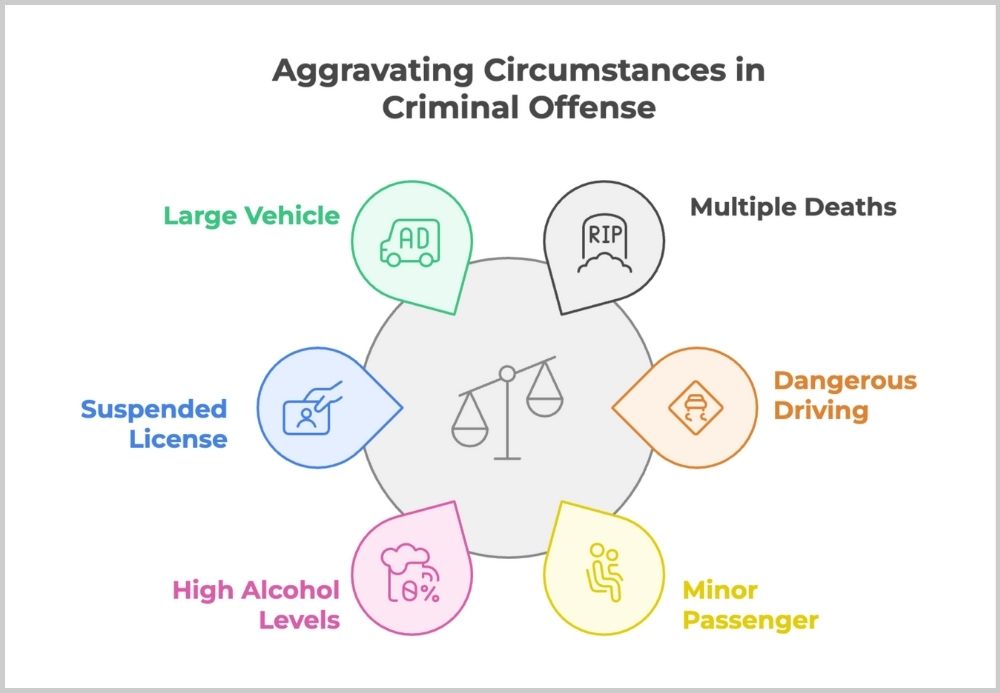Impaired Driving Causing Death
Last Updated: November 21, 2024
Impaired driving, or driving under the influence (DUI), is considered a serious criminal offence in Canada. An individual may be charged with impaired driving if the police have reason to believe they operated a vehicle while under the influence of drugs or alcohol.
Impaired driving causing death, or DUI manslaughter, is an indictable offence in Canada, meaning the consequences become far more severe, with maximum sentences of up to life imprisonment.
If you have been charged with DUI manslaughter, it is important to hire a DUI criminal defence lawyer as soon as possible.
What is Impaired Driving Causing Death?
An individual may be charged with impaired driving if their ability to operate a conveyance is impaired by the consumption of drugs or alcohol. A conveyance can include any various types of vehicles, such as cars, trucks, aircraft, boats, or railway equipment. Impaired driving causing death, also known as DUI manslaughter, results in considerably more stringent legal consequences and punishments.
Section 320.14 (3) of the Criminal Code of Canada defines impaired driving causing death as: “Everyone commits an offence who commits an offence under subsection (1) and who, while operating the conveyance, causes the death of another person”
Difference Between DUI and DUI Manslaughter
A DUI offence can be classified as a hybrid offence, meaning an individual may be prosecuted either summarily or by indictment at the discretion of the Crown. A summary offence is less severe than an indictment offence, which results in harsher punishments. As an impaired driving charge often involves drug or alcohol impairment without causing bodily harm or death, the penalties tend to be less severe than those for a DUI Manslaughter offence.
DUI Manslaughter, however, is an indictable offence and is a very serious criminal charge in Canada. DUI Manslaughter involves fatalities, such as the death of another person, and leads to significantly more severe penalties as compared to a standard DUI charge.
If you have been charged with either a DUI or DUI Manslaughter, contact us to book a free consultation to learn more about how our lawyers can defend you.

Elements Needed to Prove DUI Manslaughter
To convict an individual of DUI Manslaughter, two elements must be proven. There must be evidence of impairment by either drugs or alcohol and a causal link needs to be established between an individual’s impairment and the resulting fatality.
To establish impairment, a police officer will obtain a breathalyzer sample to determine the blood alcohol concentration level (BAC level). This involves asking the individual to blow into a breathalyzer device. Failure to provide a breath sample is a legal offence and can lead to further charges being laid and immediate arrest. A blood alcohol concentration equal to or exceeding 80 mg of alcohol in 100 mL of blood constitutes impairment due to alcohol.
However, since a breathalyzer only measures alcohol impairment, a drug test will be conducted if the police suspect an individual is under the impairment of drugs. A Drug Recognition Evaluator will perform a 12-step drug test to assess an individual’s drug blood concentration and to identify the substance involved. In some cases, an oral fluid machine, such as a SoToxa, may be used to determine whether an individual has exceeded the legal drug blood concentration. Failure to perform a drug test also constitutes a legal offence. The following are the drug cut-offs established by the Drugs and Driving Committee of the Canadian Society of Forensic Science:
- THC (cannabis): 25 ng/mL in oral fluid
- Cocaine: 50 ng/mL in oral fluid
- Methamphetamine: 50 ng/mL in oral fluid
Once impairment has been established through either an individual’s blood alcohol concentration or drug blood concentration, a causal link must be demonstrated between the impairment and the fatality. This causal link may be established if it is shown that the impairment was a significant and operative factor at the time of the accident. For instance, the court may compare an individual’s actions to those of a reasonable person. That is, did the individual operate the conveyance in a manner such that a reasonable person, unaffected by alcohol or drugs, would have in the situation? If the court finds the answer to be no, this may support the conclusion that the individual’s impairment caused the fatality, resulting in DUI Manslaughter.
Legal Penalties for DUI Manslaughter in Canada
DUI Manslaughter is one of the most serious criminal offences in Canada. As an indictable offence, the penalties for impaired driving causing death in Canada are more severe compared to a basic DUI.
An individual convicted of DUI Manslaughter may face a minimum imprisonment of 1 year, with a maximum sentence of life imprisonment.
Section 320.21 of the Criminal Code of Canada outlines the punishment for impaired driving causing death as follows:
“Everyone who commits an offence under subsection 320.13(3), 320.14(3), 320.15(3) or 320.16(3) is liable on conviction on indictment to imprisonment for life and to a minimum punishment of,
(a) For a first offence, a fine of $1,000;
(b) For a second offence, imprisonment for a term of 30 days; and
(c) For each subsequent offence, imprisonment for a term of 120 days”
In some cases, an individual may face additional penalties such as permanent criminal records, driving prohibitions, potential lifetime bans, mandatory victim impact surcharge and possible restitution. It is important to hire an experienced DUI lawyer to help minimize your penalties.
Aggravating Factors That Increase Penalties
The courts consider multiple factors that can influence the charges and penalties imposed for a DUI Manslaughter conviction. Factors such as the individual’s BAC levels, prior convictions, and the presence of a minor in the vehicle can lead to more severe penalties and harsher sentencing.
The following are aggravating circumstances as outlined under Section 320.22 of the Criminal Code of Canada.

- The offence resulted in the death of more than one individual
- The offender was engaged in dangerous driving behaviour, such as speeding, racing with another vehicle, and reckless driving
- An individual under the age of 16 was a passenger in the vehicle
- The offender had high blood alcohol concentration levels equal to or exceeding 120 mg of alcohol in 100 mL of blood
- The offender was operating the vehicle with a suspended licence
- The offender was operating a large motor vehicle
- The offender has previous DUI convictions

Defences Against DUI Manslaughter Charges
Our criminal defence lawyers understand that each case is unique and requires different defences. That is why our team carefully reviews the entire police file and outlines all applicable defences to challenge the evidence against your DUI Manslaughter charge.
The following are some effective defences against DUI Manslaughter charges:
- Challenging the Cause of Death
- To convict an individual of DUI Manslaughter, the court must prove that the individual was impaired and that there was a causal link between impairment and the fatality. If it can be demonstrated that the fatality was not a direct result of the defendant’s impaired driving – such as the presence of other contributing factors like road conditions or the actions of other drivers – this defence may apply.
- Questioning the Accuracy of Impairment Tests
- Police officers sometimes make errors when obtaining breathalyzer or blood tests to determine an individual’s impairment. Issues such as improper calibration or contamination can affect the resulting BAC levels, rendering the accuracy of the impairment tests questionable. In such cases, this defence would be relevant.
- Violation of Rights Under the Charter
- The Charter outlines an individual’s rights and freedoms before, during, and after their arrest. If the police infringe on these rights at any point throughout the process – such as through illegal search and seizure, unlawful arrest, or denial of the right to counsel – this defence may be applicable in which case, some or all of the evidence gathered by the police may be excluded at trial.
The Role of an Experienced DUI Lawyer
Hiring an experienced DUI lawyer can make all the difference when fighting your charge. You will need a lawyer who can develop a strong defence strategy to address any evidence provided against you. Our skilled lawyers will investigate the circumstances of your case, gather any relevant evidence, and work with experts to build you a strong defence strategy.
Additionally, you will need a lawyer who can effectively negotiate with the crown prosecution on your behalf. Our accomplished lawyers are equipped to conduct these negotiations to potentially reduce your charge to a lesser offence. As you may be inexperienced with the legal environment, it’s crucial to hire a lawyer who can navigate complex legal procedures. Our lawyers will assist you with pre-trial motions, plea bargains, and sentencing guidelines to ensure the best possible outcome for your DUI charge.
Get in contact with one of our experienced lawyers to learn more about what we can do for your case.
What to Do if You Are Charged with Impaired Driving Causing Death
If you have been charged with impaired driving causing death, it is crucial to contact a specialized DUI defence lawyer as soon as possible. Our criminal defence lawyers are equipped with the necessary knowledge and experience to guide you through this challenging situation.
To avoid self-incrimination, refrain from making any statements. Our lawyers will handle communications on your behalf.
To help our lawyers build you a stronger case, it is important to gather any evidence and identify potential witnesses. You can do this by documenting any details of the incident, gathering any possible supporting evidence, and identifying any potential witnesses. Once you have documented this information, our lawyers will formulate a strong defence strategy to address your DUI charge.
Conclusion
Impaired driving causing death, or DUI manslaughter, is an indictable offence and is one of the most serious criminal charges in Canada. The court considers various factors that contribute to the severity of the legal consequences of DUI causing death. It is important to have an experienced DUI lawyer handle your case. Our DUI lawyers will provide strong legal defence to ensure a fair trial and will work diligently to minimize the potential consequences. Contact our lawyers to learn more about DUI manslaughter charges and defences.
Get A Free Consultation
"*" indicates required fields



